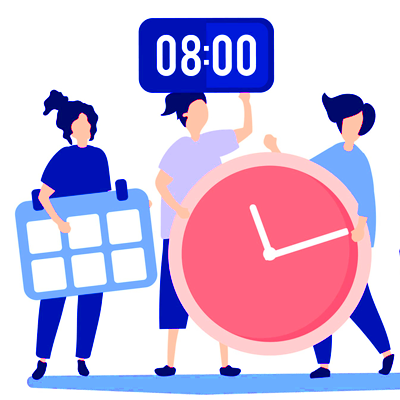7 Effective Strategies for Statistics Exam Preparation

Statistics exams can be frustrating, especially if you are unfamiliar with the various concepts and tests of analyzing data. The subject is vast and cramming all the information taught during the semester is a daunting task for most students. To pass your statistics exam with flying colors, you must prepare well. Doing this will boost your confidence as the exam day approaches. Remember, exams are not a do-or-die affair. Your mental health is just as important. Do not hesitate to seek help from your student's dean or school psychiatrist if you are struggling with examination stress and anxiety. Without wasting any time, let us dive into the seven effective strategies for statistics exam preparation.
You should always be ready and prepared
Start your preparation by covering all the topics and concepts assessed in the exam. These preparation strategies will give you the best chance to excel in your statistics test.
- Create a timetable or a study plan
- Ensure that you include breaks in your timetable
- Set a particular section that you will study for each study period
- Avoid cramming. You might get confused.
- Alternate on various topics to limit monotony. Do not study one topic for the whole day
- Have a thorough understanding of the exam you are preparing for
- The topics to be covered in the exam
- Marking rubric and other requirements
- The exam type (multiple choice questions, short answers, etc.)
- Place where the exam will be taken
- Predict questions that might be in the exam
- Choose the past exam papers to review
- What are the fundamental concepts of the course? Some critical concepts of statistics are probability, statistical sampling, distributions, etc.
- How did the instructor base their argument? It would be best to consider how the arguments join together to form the entire course material.
- Be organized when taking your notes
- Make sure that you revise actively
- write summaries
- Include diagrams and figures
- Try recording audio and videos of lectures
- Recognizing material doesn’t automatically mean you will recall it
- Keep calm and look after your health
- Avoid procrastination: Many students love doing things at the last minute. This will only raise your stress levels. Try as much as possible to stay on track with your academics. Create time to study and prepare well. If you have a lot going on in your life, you can get a professional to write your statistics exam for you.
- Stay healthy: Exercising, eating right, and getting enough sleep can physically and mentally tune you. Reading several stat materials can leave you exhausted. Breathing exercises, pushups, and even yoga can help you reboot.
- Take breaks within your studies: At the moment, it may seem that your statistics assignment is the most important thing. However, this is not usually the case. Thinking about the upcoming exam will only pile more pressure on you. If you feel tired, it is better to take a break. You can go for a walk, watch tv or check social media.
- Set goals and reward yourself: Rewarding yourself when you attain a goal is a great motivation to complete a task. A reward can be your favorite meal or thing to do.
- Know how to handle various types of exam questions
- Multiple choice exam questions (MCQs)
- The question typically has a keyword and connecting concepts that will lead you to the answer
- Before you settle on an answer, go through all the choices to make sure that the others are incorrect
- Check carefully whether the alternative solutions can give you a clue
- Make an educated guess if you are not sure of the answer
- Short answer exam questions
- You should include the essential points in the first sentence
- When the question requires more than one answer, have each idea in its paragraph
- Plan your solution before putting it down
- For extra points, include diagrams, figures, and relevant examples
- Problem-solving exam questions
- These are the most common types of exam questions in statistics. Problem-solving questions require a thorough understanding of the material and the applied concepts. It is almost impossible to guess the correct answer if you are not acquainted with the material taught in class. These tips might help you answer problem-solving exam questions:
- Please read and understand the question first before attempting it. Doing this will help you know the section of the question you should address
- You might be provided with some data to analyze. Do not come up with your own data. Use the information that has been provided.
- Think about the test, principle, or formula that should be used to answer the question
- Most statistics questions require skills in crunching numbers. For this reason, you must double-check your calculations.
- Do not forget to define the symbols that you have used in your answer
A timetable can help you manage your time well and cover all the fundamental course concepts in your study. Descriptive statistics concepts such as measures of central tendency, the dispersion of variation, and measures of frequency are more practical than theory. It is essential to draw a realistic study plan to help you cover material efficiently and realize your goals. Also, a study plan can save you from anxiety that creeps in when you feel you have not studied enough. Some of the tips that you should consider when preparing a timetable are:
Remember: You will grasp the material better if you concentrate and remain interested.

Your preparation method should be influenced by the type of exam you are preparing for. Most professors are always generous with information about the exam. Do not be shy. You can also consult your professor about the structure and nature of the test. Some course outlines and class handouts can also provide you with information about:
You should never miss exam review sessions. You will get insights into the exam and ask questions about concepts you do not understand. The information from exam review sessions can help you:
Tips to direct your revision and study
Revision is meant to boost your chances of retaining material in your long-term memory. It is only effective revision that can help you achieve this feat. Some of the questions that you should ask yourself are:
Here are tips for revision
Being organized will help you remember the nitty-gritty details of a concept. When taking notes, jot down the critical information. You can also add information that you have unearthed from your personal study. Use a marker pen to highlight essential details and add comments that emphasize the concept.
Most students waste time writing down notes that they rarely look at. Your class and revision notes are meant to help you remember information. Reading your notes is just as crucial as writing them. To make your notes more exciting and easier to read:
Actively revising your notes stimulates your memory and helps you recall information during the exam.
Going through the class materials several times can help you recognize the material when you come across it. However, this doesn't mean that you can automatically recall the information later when you are writing your statistics exam. One of the best ways to practice recalling is to share information with a discussion group or revise with your friend.
There is life after completing your statistics exam. We know that assessments come with a small amount of stress and anxiety. However, too much pressure is unhealthy and can negatively affect your academic performance. Several psychologists have recommended strategies to help students contain their stress levels before and during exams. Here are some of the strategies that we feel might be helpful:
If you are overwhelmed by your statistics exam pressure, do not think twice about making an appointment with your school counselor.

As we had already mentioned, statistics is a comprehensive course. For this reason, the type of exams may vary across disciplines. Knowing how to approach specific exam questions will leave you feeling confident.
It is wrong to assume that multiple choice exam questions need minimal revision. Some questions may require in-depth knowledge of the concept and how to apply it. The questions might not be as simple as you think. Your professor may want you to choose between similar answers. Here are strategies for approaching multiple-choice questions:
Short answer questions require a clear, precise, and logical answer. Please ensure that your instructor can understand your explanation. Some of the tips that you should consider when answering short answer statistics questions are:
Bottomline
Do not allow the pressure and anxiety to get to you. Feel confident, and remember you can do it. Although cramping and leaving the exam preparation until the last minute might work for some students, it is the worst way of approaching any exam. Considering our tips will give you the best chance of passing your statistics exam. We wish you all the best in your upcoming statistics exam.